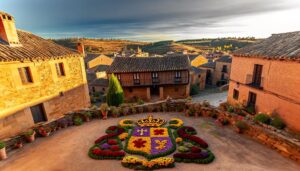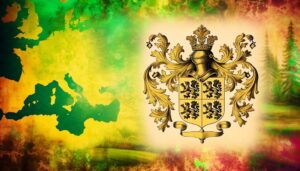Derek Name Meaning and Origin
The name Derek originates from the Old Germanic elements 'theod' and 'ric', symbolizing a leader or ruler of the people. Historically, it traces back to medieval Europe, derived from the Old High German 'Theodoric', and was prominently used by Germanic nobility and warriors.
Linguistically, it evolved through Middle Dutch 'Diederik' before becoming Derek in modern English. The name embodies leadership and governance, gaining cultural significance through historical figures and media portrayals.
It enjoyed peak popularity in the U.S. during the 1980s and 1990s and remains in use today.
For a deeper understanding of its historical and cultural journey, explore further.

Key Takeaways
- Derek derives from Old High German 'Theodoric,' meaning a leader or ruler of the people.
- It signifies qualities of leadership, authority, and communal welfare.
- The name evolved from Theodoric to Diederik in Middle Dutch and then to Derek in modern English.
- Historically associated with Germanic tribes, nobility, and warrior classes.
- Popularity peaked in the United States during the 1980s-1990s, with gradual decline in later decades.
Meaning of Derek
Deriving from the Old Germanic elements 'theod' meaning 'people' and 'ric' meaning 'ruler' or 'power,' the name Derek signifies a leader or ruler of the people. This etymology reflects a profound association with authority and governance, emphasizing a role of significant responsibility and influence.
Such connotations suggest that individuals named Derek may possess inherent qualities of leadership and a propensity for guiding others. The combination of 'theod' and 'ric' encapsulates a dual focus on communal welfare and authoritative strength. This linguistic fusion not only underscores the name's historical gravitas but also conveys a timeless relevance.
In contemporary usage, Derek continues to evoke a sense of reliability and command, resonating with those who value leadership and collective well-being.
Historical Roots
Rooted in the rich tapestry of medieval Europe, the name Derek emerged as a notable moniker among the Germanic tribes, reflecting their sociopolitical structures and cultural priorities. It is derived from the Old High German 'Theodoric,' which itself is a composite of 'theud' (people) and 'ric' (ruler or power).
This etymological foundation suggests a name bestowed upon leaders or individuals of significant influence, indicative of the tribe's hierarchical values. Historical records reveal that Derek was commonly adopted by nobility and warrior classes, further cementing its association with authority and governance.
The name's prominence in medieval texts and charters underscores its role in denoting status and power within the Germanic social order, providing insights into the era's naming conventions.
Linguistic Evolution
The linguistic evolution of the name Derek reflects a fascinating journey through time, marked by phonetic shifts, cultural exchanges, and regional adaptations that have shaped its modern form. Originating from the Germanic name Theodoric, meaning ‘ruler of the people,’ Derek evolved through various linguistic stages, influenced by Old High German, Middle Dutch, and ultimately, modern English. The name Derek also underwent a significant transformation during the Viking Age, when it was introduced to the British Isles by Scandinavian settlers. This led to the incorporation of the Old Norse ‘Dyr’ and ‘ríkr’ into the name, which translates to ‘dane meaning‘ ruler. This fusion of linguistic elements further contributed to the name’s evolution, resulting in its current widespread usage and cultural significance.
| Language | Variation |
|---|---|
| Old High German | Theodoric |
| Middle Dutch | Diederik |
| Modern English | Derek |
Phonetic transformations such as the softening of consonants and the simplification of syllabic structures were instrumental in this evolution. The name's progression through different languages highlights the dynamic interplay of linguistic elements, ensuring its enduring presence in contemporary nomenclature.
Cultural Significance
Tracing the name Derek's journey from its Germanic origins through various linguistic transformations, its cultural significance is equally profound, reflecting its adoption and adaptation across different societies and historical periods.
Originating from the Old High German 'Theodoric,' meaning 'ruler of the people,' Derek embodies a sense of leadership and authority. This name was popularized by historical figures such as Saint Theodoric, a 6th-century Frankish bishop.
In the medieval period, it spread through Europe, evolving into various forms, including the Dutch 'Diederik' and the English 'Derek.'
Its cross-cultural resonance is evident in literature, cinema, and even sports, where the name has been borne by influential characters and athletes, reinforcing its enduring legacy and multifaceted cultural relevance.
Popularity Over Time
Examining the popularity of the name Derek over time reveals intriguing patterns that reflect broader socio-cultural trends and historical contexts. The name experienced significant fluctuations in usage, offering insights into its cultural resonance and periodic appeal.
- 1940s-1950s: Emerged in the United States, gaining modest popularity.
- 1960s-1970s: Saw a marked increase, often attributed to the rise of media and sports figures bearing the name.
- 1980s-1990s: Reached peak popularity, becoming a common choice for newborns.
- 2000s: Gradual decline, reflecting changing naming preferences.
- 2010s-present: Continues to be used, albeit less frequently, maintaining a consistent although diminished presence in naming trends.
This examination underscores the dynamic nature of name popularity, influenced by an array of societal factors.
Conclusion
The name Derek, with its profound etymological roots and rich historical tapestry, encapsulates a journey through time and culture. Its evolution from Theodoric to its modern form mirrors the shifting linguistic landscapes and cultural paradigms.
The name's fluctuating popularity underscores societal trends and collective consciousness. As a moniker, Derek serves as a microcosm of linguistic adaptation and cultural continuity, embodying the intricate interplay between history, language, and identity.






